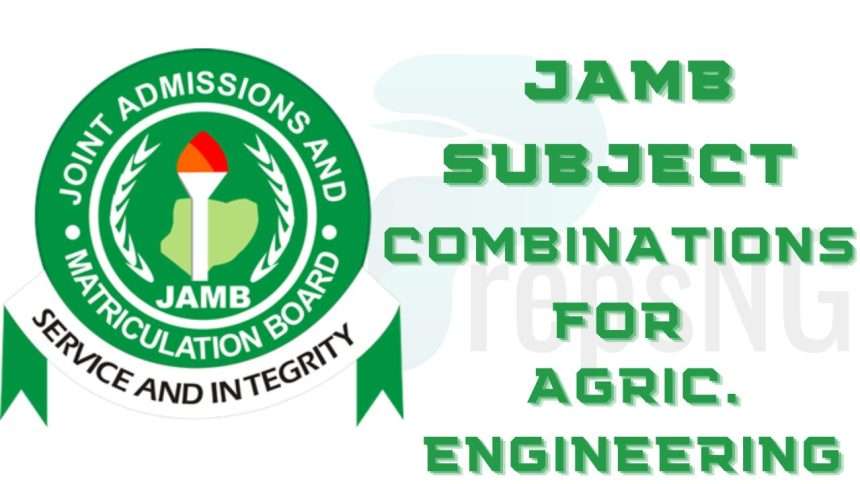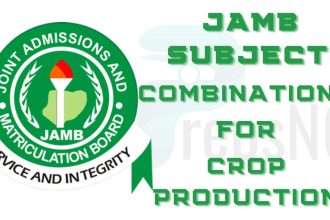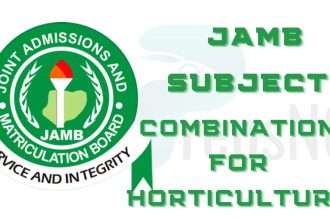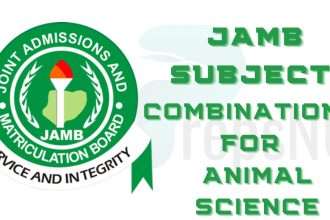JAMB Subject Combination for Agricultural Engineering: Are you interested in combining your love for agriculture and technology? Do you desire a career in designing, improving and managing agricultural machinery and systems? If so, you should consider studying Agricultural Engineering at the university.
However, gaining admission into this competitive engineering program requires choosing the right subjects for your JAMB UTME/Direct Entry exam.
In this detailed guide, you will learn the compulsory and optional subject combinations for Agricultural Engineering to boost your chances of getting into your desired degree program.
Join any of our Social Media Pages to receive Latest Updates!An Overview of Studying Agricultural Engineering in Nigeria
Agricultural Engineering focuses on applying engineering principles to agriculture. As a student, you will learn how to design and manage agricultural machinery, equipment and food/biological systems.
Some key areas covered in the program include:
- Farm machinery design
- Food processing technology
- Irrigation and drainage systems
- Agricultural structures
- Soil and water conservation
- Alternative energy applications in agriculture
- Agricultural waste management
Graduates can work in rewarding roles such as:
- Agricultural machinery manufacturing
- Irrigation system design
- Food processing and storage
- Farm structures and equipment maintenance
- Agricultural research
- Agribusiness management
- Teaching and consulting
But first, you need to cross the important hurdle of choosing suitable subjects for your JAMB exam. Let’s explore the options:
Compulsory JAMB Subjects for Agricultural Engineering
Since it is an engineering program, Agricultural Engineering has three core science subjects which are essential:
Join any of our Social Media Pages to receive Latest Updates!1. Mathematics
A strong foundation in mathematics is crucial for all engineering courses. Agricultural Engineering involves designing machines, structures and processes which requires strong analytical and problem-solving skills.
Key areas of mathematics you will need include:
- Algebra
- Trigonometry
- Geometry
- Calculus
- Statistics
- Matrices
Mathematics teaches you the tools to think logically and solve complex equations that are part of engineering.
2. Physics
Physics provides you with an understanding of the core scientific principles governing engineering such as:
- Mechanics
- Thermodynamics
- Electricity
- Magnetism
- Waves
- Properties of materials
A good grasp of physics theories is essential to excel as an agricultural engineering student.
3. Chemistry
Join any of our Social Media Pages to receive Latest Updates!Chemistry is the 3rd mandatory subject. It teaches you about:
- Atomic structure
- Chemical bonding
- Properties of elements
- Organic compounds
- Chemical reactions
- Chemical energy
This knowledge helps you understand the materials and processes involved in agricultural engineering work.
So in summary, the three compulsory JAMB subjects for agricultural engineering are Mathematics, Physics and Chemistry.
Optional JAMB Subjects for Agricultural Engineering
To complete your combination, you need to add one more relevant subject. Here are great options to consider:
Biology
Biology provides a strong base for agricultural engineering which deals with managing biological systems. Studying biology teaches you about:
- Plant and animal physiology
- Microbiology
- Ecosystems
- Genetics
- Cell structure and function
These concepts will be useful for designing agricultural solutions. Highly recommended.
Technical Drawing
This subject equips you with vital graphical skills needed to excel in engineering design work. You will learn techniques like:
- Freehand sketching
- Orthographic and isometric drawing
- Manual and CAD drafting
Essential knowledge for agricultural engineering students.
English Language
A basic language competency is required for studying at university level. English teaches grammar, vocabulary, comprehension and summary skills useful for assignments.
Economics/Geography
For students who don’t want to take 4 science subjects, Economics or Geography are arts subjects accepted by some universities. They add diversity to your academic profile.
Literature in English
For direct entry candidates, Literature in English is a great option for developing writing skills needed for higher education.
Computer Science
With the growing use of computers in agriculture, computer science adds to your tech skills. But confirm your school accepts it before choosing it.
So in summary, you can pick from:
- Biology
- Technical Drawing
- English
- Economics/Geography
- Literature in English
- Computer Science
Complete JAMB Subject Combination for Agricultural Engineering
Below are the full agricultural engineering subject combinations you should opt for:
For UTME (100 Level Entry)
- Mathematics, Physics, Chemistry and Biology
- Mathematics, Physics, Chemistry and Technical Drawing
- Mathematics, Physics, Chemistry and English
For Direct Entry (200 Level Entry)
- Mathematics, Physics, Chemistry and Literature in English
- Mathematics, Physics, Chemistry, Biology and English
- Mathematics, Physics, Chemistry, Technical Drawing and Economics/Geography
These combinations ensure you have the requirements to study agricultural engineering at university.
Tips to Excel in Your Subjects
To achieve top scores in your JAMB Agricultural Engineering subjects, here are some handy tips:
Subject-Specific Tips
For Mathematics:
- Perfect your skills in algebra, geometry, trigonometry, graphs, matrices.
- Master relevant mathematical theories, formulae and their application.
- Do lots of problem-solving questions and calculations.
For Physics:
- Understand principles governing mechanics, waves, electricity, thermodynamics, etc.
- Learn equations and units of measurements used in physics.
- Practice calculations to get faster and more accurate.
For Chemistry:
- Revise atomic structure, bonding, periodic table trends, reaction types, etc.
- Know the experiments that demonstrate various chemical principles.
- Ensure good grasp of organic, inorganic and physical chemistry topics.
For Technical Drawing:
- Learn drafting principles and techniques thoroughly.
- Practice relevant drawing types like isometric, oblique projection, etc.
- Understand how to use drawing tools like T-square, compass, scales, etc.
For Biology:
- Study ecology, cell biology, plant and animal physiology in depth.
- Revise genetics, microbiology and biotechnology topics.
General Tips
- Use recommended textbooks to adequately cover each syllabus.
- Study with a clear timetable and stick to it diligently.
- Take past JAMB questions to continually test your knowledge.
- Learn how to tackle objective, theory and calculation questions.
Using these tips will help you achieve high scores in your combination.
FAQs on JAMB Subjects for Agricultural Engineering
Here are answers to some common questions on the right subjects for agricultural engineering:
Is Mathematics compulsory for agricultural engineering?
Yes, Mathematics is mandatory for all engineering courses including agricultural engineering.
Can I use Commerce subjects like Economics? You need core science subjects. Commerce subjects may not be accepted by all universities.
Is Physics, Chemistry, Mathematics and Biology combination okay?
Yes, that’s a perfect combination for agricultural engineering candidates.
Can I apply without Chemistry or Physics? You need all three of Physics, Chemistry and Maths. Don’t omit any.
Can I use Food and Nutrition or Agric Science? You need core science subjects not agriculture-related electives. Physics, Chemistry, Maths are mandatory.
Is Literature in English accepted for UTME? No, Lit in English is only for direct entry candidates. UTME students should choose science subjects.
I hope these clarifications help you avoid making mistakes when picking your combination.
Wrapping Up
Choosing suitable subjects for your JAMB exam is the first step to getting into your desired agricultural engineering program. Combining Physics, Chemistry and Mathematics with either Biology, Technical Drawing or relevant arts/science subjects will ensure you have the requirements. Use this guide to make informed choices that align with your strengths and university of choice. All the best in your future studies and agricultural engineering career!
I hope this post has answered all your queries. If you have any questions or comments about JAMB Subject Combination for Agricultural Engineering, please feel free to leave them in the comments section below, I will be happy to answer them. And don’t hesitate to share it with others who might find it helpful too!!



![List of Accredited Courses Offered in JPTS University [year]/[nyear] 2 List of Accredited Courses Offered in JPTS University](https://www.preps.ng/wp-content/uploads/2023/10/List-of-Accredited-Courses-Offered-in-JPTS-University-150x150.webp)











![JAMB Subject Combinations for Sociology [year]/[nyear] 25 JAMB Subject Combinations for Sociology](https://www.preps.ng/wp-content/uploads/2023/08/JAMB-subject-combinations-for-Sociology-330x220.webp)